#Science Gift
Explore tagged Tumblr posts
Photo

Dinosaur Extinction Layer Soil Sample – Genuine KT Boundary Iridium-Rich Earth (65.5 Million Years Old)
Authentic KT Boundary Extinction Layer Soil Sample – From the Fall of the Dinosaurs
Uncover a moment frozen in time with this genuine KT Boundary (Cretaceous–Tertiary) soil sample, collected from the historically rich fossil beds of Slope County, North Dakota, USA. This finely preserved sample dates back 65.5 million years and represents the exact moment the dinosaurs vanished from Earth.
Each vial contains a portion of Earth’s ancient surface, formed immediately after the impact of a colossal asteroid—believed to have struck near the Gulf of Mexico—triggering the extinction of approximately 75% of all life on Earth. Rich in iridium (an element rare on Earth but abundant in asteroids) and micrometeorites, this KT Boundary layer provides compelling evidence of one of the planet’s most catastrophic mass extinctions.
Discovered in the 1980s and validated by scientists across the globe, the KT layer marks the end of the Cretaceous and the beginning of the Tertiary period. The aftermath of this event shaped the future of evolution—paving the way for mammals to rise and dominate the Earth.
🌍 You are holding history: a physical remnant from the day the world changed forever.
📦 What’s Included:
1x Vial of KT Boundary soil sample
Informative label and origin details
Packaged in a protective case for display or study
🔬 Ideal for:
Paleontology enthusiasts
Geology and science collectors
Educational and display purposes
Dinosaur fans and future scientists
Own a piece of deep time. A legacy of cosmic impact. A link to the age of dinosaurs.
#KT Boundary soil sample#dinosaur extinction layer#iridium-rich soil#Cretaceous-Tertiary boundary#asteroid impact evidence#65.5 million year old sample#mass extinction layer#Chicxulub impact layer#paleontology specimen#geology collectible#real dinosaur era soil#extinction event sample#KT layer vial#fossil record evidence#science gift#educational geology sample#authentic KT boundary#dinosaur fossil era#asteroid extinction layer#rare earth element sample
0 notes
Text





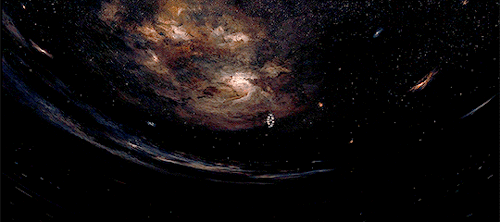


Interstellar (2014) dir. Christopher Nolan
Love is the one thing we're capable of perceiving that transcends dimensions of time and space. Maybe we should trust that, even if we can't understand it…
#interstellar#interstellar re-release#christopher nolan#hans zimmer#movies#film#cinema#cinephile#letterboxd#scifi#filmedit#moviegifs#space#outer space#astronomy#astrophysics#nasa#science#science fiction#cornfield chase#matthew mcconaughey#anne hathaway#jessica chastain#2010s#2014#10 year anniversary#december 6#best birthday gift#aesthetic#gif
914 notes
·
View notes
Text
Sandra Newman’s “Julia”

The first chapter of Orwell's Nineteen Eighty-Four has a fantastic joke that nearly everyone misses: when Julia, Winston Smith's love interest, is introduced, she has oily hands and a giant wrench, which she uses in her "mechanical job on one of the novel-writing machines":
https://gutenberg.net.au/ebooks01/0100021.txt
That line just kills me every time I re-read the book – Orwell, a novelist, writing a dystopian future in which novels are written by giant, clanking mechanisms. Later on, when Winston and Julia begin their illicit affair, we get more detail:
She could describe the whole process of composing a novel, from the general directive issued by the Planning Committee down to the final touching-up by the Rewrite Squad. But she was not interested in the finished product. She 'didn't much care for reading,' she said. Books were just a commodity that had to be produced, like jam or bootlaces.
I always assumed Orwell was subtweeting his publishers and editors here, and you can only imagine that the editor who asked Orwell to tweak the 1984 manuscript must have felt an uncomfortable parallel between their requests and the notional Planning Committee and Rewrite Squad at the Ministry of Truth.
I first read 1984 in the early winter of, well, 1984, when I was thirteen years old. I was on a family trip that included as visit to my relatives in Leningrad, and the novel made a significant impact on me. I immediately connected it to the canon of dystopian science fiction that I was already avidly consuming, and to the geopolitics of a world that seemed on the brink of nuclear devastation. I also connected it to my own hopes for the nascent field of personal computing, which I'd gotten an early start on, when my father – then a computer science student – started bringing home dumb terminals and acoustic couplers from his university in the mid-1970s. Orwell crystallized my nascent horror at the oppressive uses of technology (such as the automated Mutually Assured Destruction nuclear systems that haunted my nightmares) and my dreams of the better worlds we could have with computers.
It's not an overstatement to say that the rest of my life has been about this tension. It's no coincidence that I wrote a series of "Little Brother" novels whose protagonist calls himself w1n5t0n:
https://craphound.com/littlebrother/Cory_Doctorow_-_Little_Brother.htm
I didn't stop with Orwell, of course. I wrote a whole series of widely read, award-winning stories with the same titles as famous sf tales, starting with "Anda's Game" ("Ender's Game"):
https://www.salon.com/2004/11/15/andas_game/
And "I, Robot":
https://craphound.com/overclocked/Cory_Doctorow_-_Overclocked_-_I_Robot.html
"The Martian Chronicles":
https://escapepod.org/2019/10/03/escape-pod-700-martian-chronicles-part-1/
"True Names":
https://archive.org/details/TrueNames
"The Man Who Sold the Moon":
https://memex.craphound.com/2015/05/22/the-man-who-sold-the-moon/
and "The Brave Little Toaster":
https://archive.org/details/Cory_Doctorow_Podcast_212
Writing stories about other stories that you hate or love or just can't get out of your head is a very old and important literary tradition. As EL Doctorow (no relation) writes in his essay "Genesis," the Hebrews stole their Genesis story from the Babylonians, rewriting it to their specifications:
https://www.penguinrandomhouse.com/books/41520/creationists-by-e-l-doctorow/
As my "famous title" stories and Little Brother books show, this work needn't be confined to antiquity. Modern copyright may be draconian, but it contains exceptions ("fair use" in the US, "fair dealing" in many other places) that allow for this kind of creative reworking. One of the most important fair use cases concerns The Wind Done Gone, Alice Randall's 2001 retelling of Margaret Mitchell's Gone With the Wind from the perspective of the enslaved characters, which was judged to be fair use after Mitchell's heirs tried to censor the book:
https://en.wikipedia.org/wiki/Suntrust_Bank_v._Houghton_Mifflin_Co.
In ruling for Randall, the Eleventh Circuit Court of Appeals emphasized that she had "fully employed those conscripted elements from Gone With the Wind to make war against it." Randall used several of Mitchell's most famous lines, "but vest[ed] them with a completely new significance":
https://law.justia.com/cases/federal/appellate-courts/F3/268/1257/608446/
The Wind Done Gone is an excellent book, and both its text and its legal controversy kept springing to mind as I read Sandra Newman's wonderful novel Julia, which retells 1984 from the perspective of Julia, she of the oily hands the novel-writing machine:
https://www.harpercollins.com/products/julia-sandra-newman?variant=41467936636962
Julia is the kind of fanfic that I love, in the tradition of both Wind Done gone and Rosenkrantz and Gildenstern Are Dead, in which a follow-on author takes on the original author's throwaway world-building with deadly seriousness, elucidating the weird implications and buried subtexts of all the stuff and people moving around in the wings and background of the original.
For Newman, the starting point here is Julia, an enigmatic lover who comes to Winston with all kinds of rebellious secrets – tradecraft for planning and executing dirty little assignations and acquiring black market goods. Julia embodies a common contradiction in the depiction of young women (she is some twenty years younger than Winston): on the one hand, she is a "native" of the world, while Winston is a late arrival, carrying around all his "oldthink" baggage that leaves him perennially baffled, terrified and angry; on the other hand, she's a naive "girl," who "doesn't much care for reading," and lacks the intellectual curiosity that propels Winston through the text.
This contradiction is the cleavage line that Newman drives her chisel into, fracturing Orwell's world in useful, fascinating, engrossing ways. For Winston, the world of 1984 is totalitarian: the Party knows all, controls all and misses nothing. To merely think a disloyal thought is to be doomed, because the omnipotent, omniscient, and omnicompetent Party will sense the thought and mark you for torture and "vaporization."
Orwell's readers experience all of 1984 through Winston's eyes and are encouraged to trust his assessment of his situation. But Newman brings in a second point of view, that of Julia, who is indeed far more worldly than Winston. But that's not because she's younger than him – it's because she's more provincial. Julia, we learn, grew up outside of the Home Counties, where the revolution was incomplete and where dissidents – like her parents – were sent into exile. Julia has experienced the periphery of the Party's power, the places where it is frayed and incomplete. For Julia, the Party may be ruthless and powerful, but it's hardly omnicompetent. Indeed, it's rather fumbling.
Which makes sense. After all, if we take Winston at his word and assume that every disloyal citizen of Oceania is arrested, tortured and murdered, where would that leave Oceania? Even Kim Jong Un can't murder everyone who hates him, or he'd get awfully lonely, and then awfully hungry.
Through Julia's eyes, we experience Oceania as a paranoid autocracy, corrupt and twitchy. We witness the obvious corollary of a culture of denunciation and arrest: the ruling Party of such an institution must be riddled with internecine struggle and backstabbing, to the point of paralyzed dysfunction. The Orwellian trick of switching from being at war with Eastasia to Eurasia and back again is actually driven by real military setbacks – not just faked battles designed to stir up patriotic fervor. The Party doesn't merely claim to be under assault from internal and external enemies – it actually is.
Julia is also perfectly positioned to uncover the vast blank spots in Winston's supposed intellectual curiosity, all the questions he doesn't ask – about her, about the Party, and about the world. I love this trope and used it myself, in Attack Surface, the third "Little Brother" book, which is told from the point of view of Marcus's frenemy Masha:
https://us.macmillan.com/books/9781250757531/attacksurface
Through Julia, we come to understand the seemingly omniscient, omnipotent Party as fumbling sadists. The Thought Police are like MI5, an Island of Misfit Toys where the paranoid, the stupid, the vicious and the thuggish come together to ruin the lives of thousands, in such a chaotic and pointless manner that their victims find themselves spinning devastatingly clever explanations for their behavior:
https://www.bbc.co.uk/blogs/adamcurtis/entries/3662a707-0af9-3149-963f-47bea720b460
And, as with Nineteen Eighty-Four, Julia is a first-rate novel, expertly plotted, with fantastic, nail-biting suspense and many smart turns and clever phrases. Newman is doing Orwell, and, at times, outdoing him. In her hands, Orwell – like Winston – is revealed as a kind of overly credulous romantic who can't believe that anyone as obviously stupid and deranged as the state's representatives could be kicking his ass so very thoroughly.
This was, in many ways, the defining trauma and problem of Orwell's life, from his origin story, in which he is shot through the throat by a fascist: sniper during the Spanish Civil War:
https://www.rjgeib.com/thoughts/soldiers/george-orwell-shot.html
To his final days, when he developed a foolish crush on a British state spy and tried to impress her by turning his erstwhile comrades in to her:
https://en.wikipedia.org/wiki/Orwell%27s_list
Newman's feminist retelling of Orwell is as much about puncturing the myth of male competence as it is about revealing the inner life, agency, and personhood of swooning love-interests. As someone who loves Orwell – but not unconditionally – I was moved, impressed, and delighted by Julia.

Tor Books as just published two new, free LITTLE BROTHER stories: VIGILANT, about creepy surveillance in distance education; and SPILL, about oil pipelines and indigenous landback.


If you'd like an essay-formatted version of this post to read or share, here's a link to it on pluralistic.net, my surveillance-free, ad-free, tracker-free blog:
https://pluralistic.net/2024/09/28/novel-writing-machines/#fanfic
#pluralistic#reviews#books#orwell#george orwell#nineteen eighty-four#1984#little brother#fanfic#remix#gift guide#science fiction#sandra newman
703 notes
·
View notes
Text
The Ishigamis and The Gifts of Science
Dr. Stone is a love letter to humanity and its sciences. The main character, Senku, often acts averse to all forms of affection, and the only love he doesn't deny is his love for science. But Senku is so so full of love. He just expresses it in a way other than physical touch or words of affirmation. He gives.
But let's go back to the one who taught him so– Byakuya Ishigami, his father. The love of Senku's life.

Byakuya is introduced in the tenth chapter of the manga as a dotting father who sells his car to present Senku with scientific instruments he will need for a more efficient research. This car is Byakuya's means of transportation, and given that he is crying and shaking in this scene, it could not have been easy for him to lose it. But his love for Senku is so big, that he wants to support his son's passion even if it means sacrificing a great convenience for him.
And Senku? Senku truly fell in love with science at this moment.
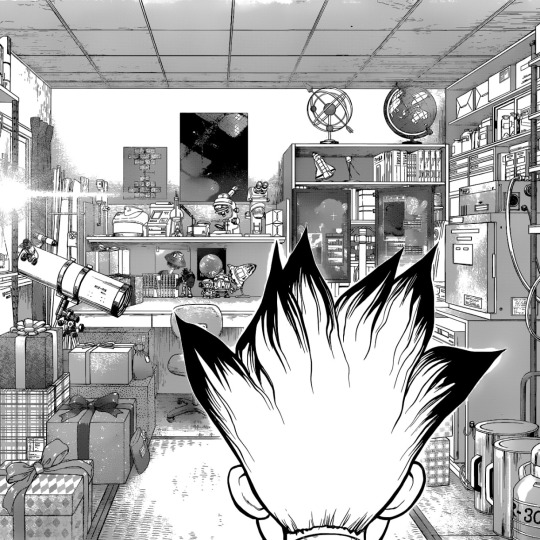
If there is anything that Senku is, he is Byakuya Ishigami's son through and through. They may seem like two very different people, as Byakuya is an openly affectionate guy while Senku is more closed off with showing his true emotions. But Senku takes more from Byakuya than not, and one of them is by showing his love and/or care for others through giving the gifts of science.
And it starts with Byakuya.
[Bodysuit Acquired!]
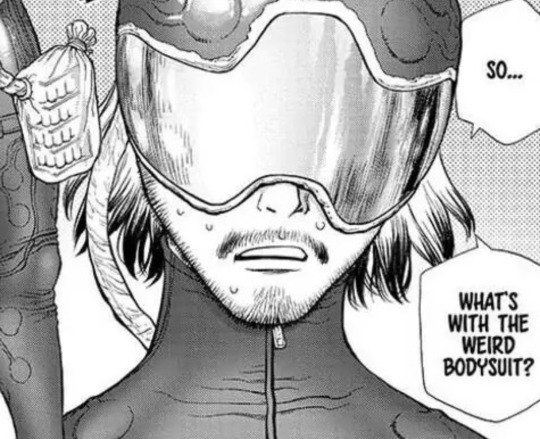
Byakuya had failed his first attempt at being an astronaut ten years back, but he doesn't give up and tries again. Senku then creates a bodysuit that manipulates muscle movement to help Byakuya pass his swimming test. And while the bodysuit doesn't quite help Byakuya to swim, the thought Senku had put into it had motivated Byakuya more than ever to pass the test. This is one of the fundamentals of gifting– sometimes, it really is the thought behind it that matters.
This motivation is what Byakuya credits during his interview with JAXA for passing the tests. He understands that Senku might not have given him any words of encouragement, but this bodysuit was all the words that were needed between them. Senku wants Byakuya to achieve his dreams just as badly. It's the way Senku shows his love for his father.
And it's the way Senku shows his love for others too.
[Glasses Acquired!]

One of the primitive aspects of the Ishigami village is that it considers bad eyesight as a type of "disease". Fuzzy disease, to be exact.
Suika wears a melon mask at all times to help clear her eyesight, which Senku later reveals is due to the pinhole effect. She, however, has never told Senku or the others about having the fuzzy disease. Senku himself notes how odd it is for her to wear a melon around, and confronts her about it once he decides to create glass. This is one of the most beautiful scenes in Dr. Stone, as Suika finds out that her disease was never a disease, and is finally able to see as clearly as the others. Senku basically gives her perfect eyesight, something she didn't even know was possible before.
[Antibiotics Acquired!]
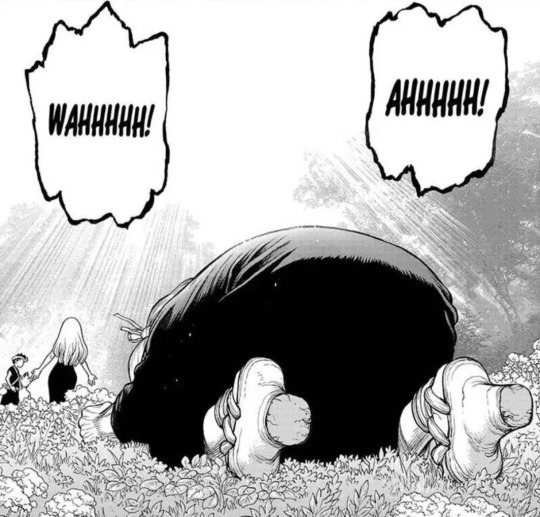
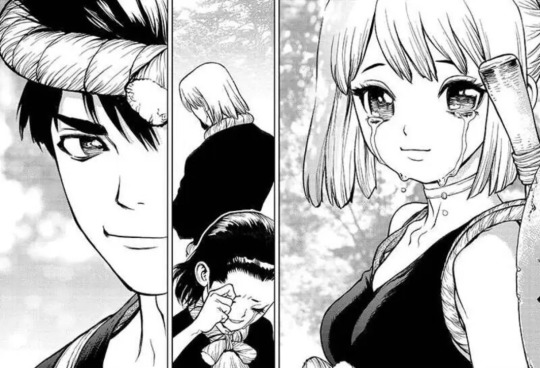
One of the most beloved people in this village is the priestess, Ruri. Two of Senku's new friends, Kohaku and Chrome are deeply affected by her unknown fatal disease. Senku is such a person who would help a stranger even if there is no benefit to do so (though he would never admit to it), what more a person who his new friends truly love and care about. He cures Ruri of pneumonia, giving her a chance to live a life without the worry of it being her last day every day.
[Cola Acquired!]

Senku forms an alliance with Gen, who plays the role of Tsukasa's spy, for the promise of a bottle of cola. Both Senku and Gen are aware that the cola is only a front for Gen's loyalty to Senku and the Kingdom of Science, for Gen needs his superficial reputation as a comfort and cannot simply join them if there is no personal benefit for him to do so.
This cola is also the first gift post-petrification that Senku brands himself on, probably because it represents the first gift that is not out of necessity and leans toward a comfort/luxury that they both used to enjoy in the modern world.
For a modern man such as Gen, drinking his favourite soda in the stone world might have been one of the happiest days in his life.
[Cotton Candy Acquired!]
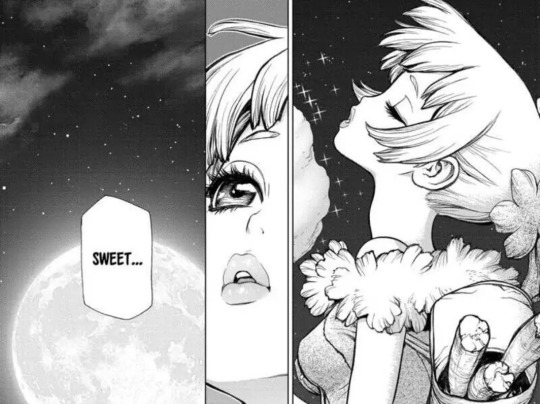
Senku cares about people so much, even if the people in question have tried to kill him. Senku sees Homura as a soldier who is merely following the orders given by her leader, but he also sees the Homura as a lonesome girl sitting by herself on trees day and night.
As usual, Senku hides his kindness and care by showing an evil ulterior motive, such as turning Homura to their side using the cotton candy, but Ruri points out that this is a facade. Similarly to Gen, a person with such an ego is unable to seem as if he is doing something good out of the kindness of his heart.
[Stove Acquired!]
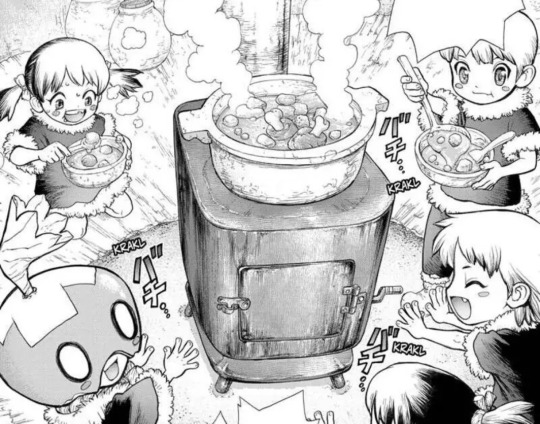
As winter approaches, the elders in the village are worried about losing people to the cold. Senku hears about this and creates a stove which has a multi-purpose of cooking and also radiating heat for the people to stave off the coldness of winter. And speaking of winter...
[Christmas Acquired!]

Senku hangs up lights in the tree for the "light bulb test" on a random night. Except the date isn't random at all and he drops enough hints for Gen to catch on that it is the night of Christmas. The significance of the day is only appreciated by Gen and himself, as they are the only modern timers in the village. It is for the sake of nostalgia, but Senku would rather be caught dead than admit that he is a sentimental guy with such irrational feelings.
And well, it all comes back to that scene with Byakuya, doesn't it? If you recall, Byakuya calls himself "Santa" while giving the scientific presents to the young Senku. This indicates Senku received them during Christmas. Which means... Christmas is a sentimental day to Senku and his father. An anniversary of Senku receiving his Christmas presents from Byakuya, which led to his deeper dive into his science obsession. The beginning of it all, one would say.
And even though he's dead and buried, Byakuya never stops giving. He gives Senku the Ishigami village to provide Senku with allies. He gives Senku Lillian's music, because he believes in the light of music and understands the importance of media to society. He collects platinum till his last breath, because he believes that Senku will need it someday. Byakuya keeps on giving to Senku, because his love for his son is so huge and unconditional. And because he promised.
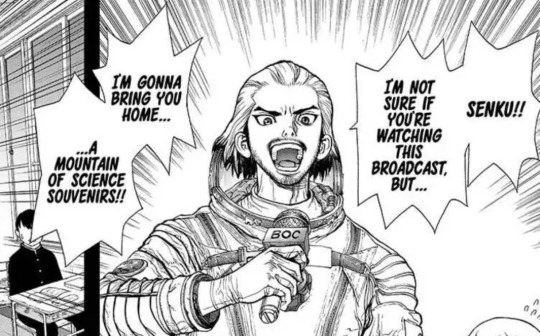
Surely, there is no greater love in the manga than Byakuya's love for his son and Senku's love for his father. Byakuya could easily win ten billion best father awards... well, not like there's much competition for that in shounen mangas.
#wrote this at 7am and went back to sleep immediately#and now that im wide awake again and rereading it it isnt that bad so erm ok hit post!#anyways i just rly rly rly love senkus and byakuyas relationship ok#the times ive cried for dr stone? ALWAYS FOR THEM#byakuya collecting platinum moment and dying...#i have lots of thoughts abt senku and byakuya and senkus love for his dad#the way the manga ended... it rly shows how senku is still always thinking abt his dad first and foremost#the love of a parent and how their children will always be just a little kid to them...#lots of ellipsis in these tags lmao#theres actually even more moments of senku giving stuff to others ofc#like giving tsukasa literal LIFE and the camera to minami yada yada#but yea i think these points r enough to show that senku rly invents things for ppl to show affection#like sure he enjoys creating science shit#but he also cares abt them and it's why he does it#i would say that gift giving is his love language or whatever#but ive heard that that love language stuff is bs so idk anymore#ask gen abt mentalism lore not me#wait no even if it was bs gen would not care and would have it in his psychology book#it's senku who would get triggered methinks#anyways lets just assume it's not bs and well#theres that thing where u make another person feel appreciated not based on ur own love language but based on THEIR love language#so like for example to make senku feel loved u should give him presents#and so far i think ive noticed three ppl doing this...? byakuya yuzuriha and gen#maybe theres more but i cant think of anyone else now#well might make another post in the future on this idk. or ill just reblog this one to continue#senku ishigami#byakuya ishigami#dr stone#dcst#long post
241 notes
·
View notes
Text
Apropos of nothing, here's my personal headcanon in regards to Mario and Luigi's surname.
Now, it's been generally announced and accepted that the brothers' last name is "Mario," shackling them with the somewhat awkward full names of "Mario Mario" and "Luigi Mario." My take on this is that the family's original last name was "Marianetti" (likely coming from the more common "Marinetti"). This name was changed to "Marionetti" when the boys' grandmother came over from Italy. (A common occurrence in record keeping at immigration at the time. Someone probably had bad handwriting and smudged a pencil stroke somewhere. It happened in my family for sure).
In Brooklyn, their father went by the last name "Marionetti," which ended up shortened to just "Mario," as oftentimes he would be addressed by his surname only. (Think, "Hey, Mario! Get over here!" as opposed to "Hey, Marionetti! Get over here!")
So, the boys are born and get their names. (Their father's middle name was Mario, and so our Mario, being the oldest, inherits his father's middle name as his first name. Luigi's name maybe comes from the middle name of some uncle who is long out of the picture).
So we have "Mario Marionetti" and "Luigi Marionetti." Which, their surname being a mouthful, gets shortened to "Mario" more often than not, just like their father. And thus we end up with "Mario Mario" and "Luigi Mario," culminating in the "Mario Brothers."
#hello there#this is based on zero science and mostly a way for me to explain the weird last name thing#i also came up with middle names for the boys based wholly on how i feel they sound and look written down#mario's middle name would be alphonso and luigi's would be giovanni#but i just looked up the meaning of the names and they're PERFECT for the boys#alphonso being “noble and ready to battle”#and giovanni being “gift from god” which would fit with luigi being the second younger twin#also if these definitions are off forgive me and google hahahaha#but the bros don't use those middle names in real life except to annoy each and embarrass each other#anyway enjoy that little tidbit while i go back to work
2K notes
·
View notes
Text

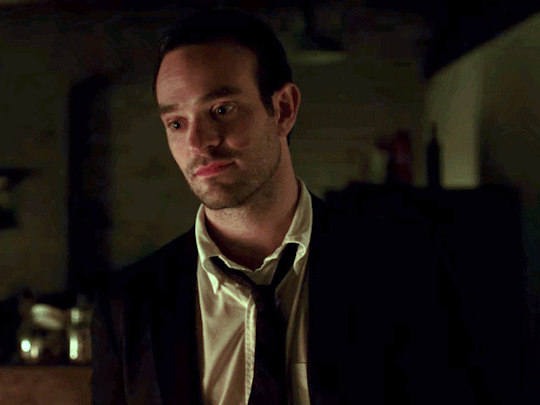




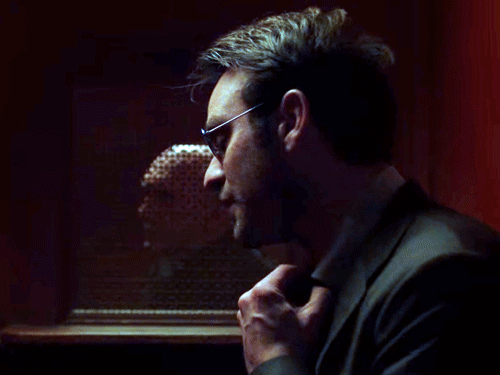
Matt Murdock loosening his tie #forscience
+ bonus

#so turns out i had these gifs done and made in 2022 and just never posted them. today felt like an appropriate day to gift them to yall ❤️#marveledit#matt murdock#daredevil#charlie cox#daredeviledit#mcuchallenge#marvel#for science#matt wearing jessicas scarf seems to be a recurring bonus gif lmao#red m&m#handsome devil
1K notes
·
View notes
Note




SOME QUICK SILLIES FOR YOU MY GUY 💕💕
Hope you’re okay!!
OH THIS HEALED MY SOUL I AM SOBBING AAAAAAA YOUR ARTSTYLEEE ♡♡
my beloved marshmallow man I'll never get enough of the way you draw him 😭😭🤍
STAR GAVE HIM A COMICALLY LARGE ROSE WHAT IF I EXPLODE wholesome skystar is my biggest weakness (act surprised pls)
thank you for all of these. getting back to tumblr after a long time and seeing your art is always such a treat 🫂💕
#so sorry for responding so late 😭😭#i was in the wilderness doing science stuff (biologist on a fieldwork sampling) and i barely had signal or even time to be online 💔#but coming back to see your ask was such a wonderful gift ty 😭💕💕#skyfire#starscream#jetfire#skystar#not my art#asks#wish i had a doodle for you to but i was way too busy 💔 hopefully soon
113 notes
·
View notes
Text
Mysterious to You
Usually, in the space courier business, the things we’re given to deliver are packaged well. In containers that stay shut. Usually.
“Where does this one go?” Mur asked, dangling a cloth from one blue-black tentacle. “It’s got to be for childcare, right?”
Eggskin took it, buffed their scales briefly, then said, “Nope. This one’s for cleaning kitchenware. See the logo?”
Mur draped a tentacle across his squiddy head in annoyance. “See it, sure; recognize it, no. Here, this definitely goes in the childcare box. That much I know.” He passed a plastic-wrapped bundle of diapers to me. “It’s even your species.”
“That it is,” I agreed, placing it in the correct box. “And the package didn’t rip in the spill, which is good.”
Mur gave me a suspicious look. “Those are only smelly after they’ve been applied to an infant, right?”
“Yes,” I said firmly. “It’s all the horrendous befouling that happens next that stinks, not the material of the diaper itself. I was more concerned about the diapers getting contaminated with something.”
“Well we can’t have that,” Mur said, picking up several more items with multiple tentacles at once. “The baby humans should only befoul the cleanest of disposable clothing.”
I boxed a pack of wet-wipes and a rattle. “Do your people not do diapers?”
Mur made a wet snort. “Our littles swim in regularly-filtered water until they’re more than old enough to poop in the correct place,” he told me. “Any befouling done on land is due to intestinal problems, not youth.”
“Sounds convenient,” I told him (narrowly avoiding saying “handy” to a guy with no hands). “I’m sure many human parents would be jealous.”
“As they should be,” Mur said, sorting a case of silverware, a stack of cups, and a package of napkins into the kitchen box. He double-checked the napkins.
Eggskin held up a flat ring of green rubber, textured with a scaly pattern that wasn’t too different from their own arm. “Now this one I don’t recognize,” they admitted. “Is this for bundling tools together? It’s grippy enough.”
“Beats me,” Mur said. “Something for the disciplinary sector? Is this one of those ‘handcuffs’ I’ve heard about?”
I smiled and held out a hand for it. “No, handcuffs open and close so you can’t wiggle out, and they’re not this soft.” I squeezed the dense rubber. “Yeah, this is a teething toy. 100%.”
“Ohhh.” Eggskin cast their eyes upward. “Of course it is. I forgot how vicious human young ones are about that.”
“Teething,” Mur repeated, sounding suspicious. “I seem to have missed that fun fact. How are young humans vicious about teeth?”
I set the teething ring on top of the diapers. “We’re born without visible teeth, then when we’re old enough to try solid food, the teeth gradually push through our gums until they’re free. Babies chew on things to help their teeth cut through faster.”
Mur’s alien face wrinkled into mild horror. “Why? Why not just have them out from the start?”
“Well, then the babies would bite their moms when they’re nursing. I understand the teething period is pretty painful.”
Mur turned his horrified face toward Eggskin, who nodded sympathetically.
Eggskin asked gently, “You remember milk? The first food they eat?”
“But all those milk foods they talk about come from another animal!” Mur objected. “The things with ‘cheese’ are from those ‘gows’ — I forgot humans make it themselves too!”
“Cows,” I corrected.
Mur shuddered, tentacles rippling, then composed himself and picked up more items from the pile. “That is gross,” he declared. “On par with diapers. What’s this one?”
“Childcare,” Eggskin said, plucking the pacifier from Mur’s grasp and handing it to me.
“Yup,” I agreed.
“Do I even want to know?” Mur asked.
I said, “It’s a thing for babies to suck on when they’ve already eaten but still want to nurse.”
“Yeah, I didn’t need to know that. How much more of this stuff is there to sort through? I can’t believe no one else is free to help. Wait, wasn’t Paint supposed to be here too?” Mur looked toward the door.
Eggskin said, “She chased off after something that rolled away when the boxes first opened.”
“Bah.” Mur sorted a few more things. “Still can’t believe those idiots didn’t seal the boxes properly. You’d think they never shipped anything before. If this was some young fool living on their own for the first time, sure, that’s to be expected. But isn’t this for a colony somewhere?”
I said, “A little one. More of an offshoot of an existing settlement.” The briefing hadn’t gone into much detail.
“Still, you’d expect them to behave like real adults.” Mur shook a toy with ironic vigor. It was a miniature version of himself with paler blue coloring, and a layer of fluff that he definitely didn’t have. He passed it in my direction.
“There are idiots everywhere,” I said philosophically as I took it. “You know, it’s cute that your little ones have snuggle buddies like this too.”
“They don’t,” he said.
Eggskin glanced over in amusement. “Pretty sure that was made for your species.”
“Oh.” I looked down at the plush toy. “That explains the fuzz.” It really was nicely soft. I stroked it a couple times before putting it away.
“Aha!” Mur said. “Now this I recognize! That colony does have a Strongarm population after all. Somebody’s going to love this.” He held out a small object to me: oddly-shaped and smooth gray.
I turned it over in deepening confusion. It was roughly fist-sized, with cavities and crevices and a few seams that said it might come apart. I wasn’t quite curious enough to risk damaging it by testing that. “What is it?” I asked.
“A puzzlecave,” Mur told me, taking it back. He stuck tentacle-tips into some of the dents and rotated it like an alien Rubik’s Cube. That opened up a passageway clear through to the other side — he wriggled a tentacle out the other end, then pulled it back and reformed the thing into its original shape. “First it’s a cave, then it’s a puzzle.” He gave it back.
Still baffled, I asked, “How is it a cave?”
Eggskin cut in, holding clawed fingertips close together. “Newly-hatched Strongarms are about this big,” they told me. “And they like hiding.”
“Oh!” I looked down at it in a new light. “You get to grow up and use your old hidey-hole as a puzzle? That is wild.”
“Not as wild as any of that nonsense with teeth,” Mur said.
I shrugged. I couldn’t really argue that.
Footsteps approached in the hall, then the door slid open to admit Paint and the thing she’d apparently chased halfway across the ship. It was huge.
“I got it!” Paint exclaimed, wrestling a hollow sphere through the door by its handles. She looked like a cheerful orange fence lizard who had caught a soap bubble … which had handles for some reason.
“Well done,” Eggskin said. “That was quite a chase.”
“It rolled down into the engine room!” Paint said, maneuvering it over to a mostly-empty box. “Mimi had to help me get it out. It got stuck. He wasn’t happy.”
“I bet,” I said. “So, question of the day: what is it?”
“No idea,” Paint admitted. “But it came out of this box.” She rotated the box to see the label. “‘Peacekeeping Division’?”
Mur looped a tentacle over the side of the box like it was an elbow. “Remember how I didn’t know what handcuffs look like?” he asked.
“Yeah?” I said.
“That’s because when a species doesn’t have hands, and everybody can wriggle out of confinement, you stuff your troublemakers into these.” He pointed at the ball, which did have tiny air holes now that I thought about it.
“That’s fascinating!” Paint said. “It makes sense! Is it uncomfortable, though?”
“I wouldn’t know; I’m not a troublemaker.”
Eggskin told her, “I understand they’re not kept in there long-term. Just enough to get them from the scene of the troublemaking back to regular confinement. And Strongarms are famous for fitting easily into tight spaces.”
“That we are,” Mur said proudly.
“Well, you know who else likes that sort of thing?” I said. “Human children. I hope the people receiving this stuff know to keep that hamsterball out of reach, or else somebody’s going to have a lot of fun before the grownups notice.”
That led to a dramatic retelling of the long and ill-advised tradition of climbing inside truck tires and rolling down hills. None of my alien coworkers thought this was remotely reasonable, but none of them were surprised that it was a thing my species did.
~~~
These are the ongoing backstory adventures of the main character from this book.
Shared early on Patreon! There’s even a free tier to get them on the same day as the rest of the world.
The sequel novel is in progress (and will include characters from these stories. I hadn’t thought all of them up when I wrote the first book, but they’re too much fun to leave out of the second).
#my writing#The Token Human#this started with just one idea for cultural differences#and it went from there#there's at least one other detail that I could have included and just didn't think of it#maybe that'll come up in a different story#conversations like these are the gift that keeps on giving#humans are weird#and so are the aliens#haso#hfy#eiad#science fiction#writeblr#writblr
139 notes
·
View notes
Text

#the girl with all the gifts#m.r. carey#horror#science fiction#book poll#have you read this book poll#polls#requested
57 notes
·
View notes
Text

From The New York Times bestselling author of The Atlas Six comes the story of three siblings who, upon the death of their father, are forced to reckon with their long-festering rivalries, dangerous abilities, and the crushing weight of all their unrealized adolescent potential. ✨ @olivieblake's Gifted and Talented is out on 4/01!!
#Tor Books#Booklr#New books#Science Fiction#Fantasy#Tbr#Sci-fi#Bookworm#Bookish#SFF#Gifted & Talented#The Atlas Six#Olivie Blake
65 notes
·
View notes
Photo

Reedops Fossil Trilobite - Devonian Laatchana Jbel Mrakib, Morocco - Genuine Specimen w/ COA
This is a genuine fossil specimen featuring two well-preserved Reedops trilobites, discovered in the Devonian-aged Laatchana Formation of Jbel Mrakib, Morocco. Dating back to the Devonian period (~419-359 million years ago), these trilobites were agile seafloor scavengers that thrived in ancient marine ecosystems abundant with life.
The fossil is exceptionally detailed, showcasing the characteristic convex exoskeleton, well-defined segmentation, and intricate eye structure of Reedops. Fossils from the Jbel Mrakib region are world-renowned for their incredible preservation, offering a rare glimpse into the biodiversity of Devonian marine environments.
Key Features:
Species: Reedops (Prehistoric Trilobite)
Fossil Type: DOUBLE Trilobite Specimen
Age: Devonian (~419-359 million years old)
Formation: Laatchana Formation
Location: Jbel Mrakib, Morocco
Condition: Well-preserved, showcasing detailed exoskeletons and segmented features
Authenticity: 100% genuine fossil, supplied with a Certificate of Authenticity
Photo: The item in the listing is the exact specimen you will receive
Reedops trilobites were bottom-dwelling arthropods that roamed the ancient seafloor, using their compound eyes to detect movement and changes in their environment. Their well-developed exoskeletons provided protection from predators, and their ability to roll into a defensive position made them highly adapted survivors of their time.
This fossil is an excellent addition to any fossil collection, natural history display, or educational exhibit. It also makes a fantastic gift for fossil enthusiasts, geologists, and those fascinated by prehistoric marine life.
Additional Information:
Scale cube = 1cm for size reference. Please see listing photos for full dimensions.
This is a carefully selected, high-quality specimen.
Ships securely packaged to ensure safe arrival.
All of our Fossils are 100% Genuine Specimens & come with a Certificate of Authenticity
Fast & Secure Shipping – We take great care in packaging each fossil to ensure it arrives in perfect condition!
Own a rare and scientifically significant piece of prehistoric history – add this DOUBLE Reedops Fossil Trilobite from the Devonian, Jbel Mrakib, Morocco to your collection today!
#Fossil Trilobite#Reedops Fossil#Devonian Fossil#Laatchana Fossil#Jbel Mrakib Fossil#Morocco Fossils#Prehistoric Arthropod#Fossilized Trilobite#Marine Fossil#Fossil Collecting#Authentic Fossil#Natural History#Fossil Specimen#Geological Collectible#Fossil Gift#Science Gift#Paleontology#Fossilized Arthropod#Trilobite Evolution
0 notes
Text
Day 7 fact about me:
The only celebraties I knew the names of as a child were Tim Burton and David Attenborough.
I happened to be equally enamoured with learning and vaguely morbid themes. (Which, I'm sure, had absolutely no impact on the aforementioned lack of friends...)
This led to MANY contented hours spent watching nature, space, and science documentaries from the local library, for information. As well as a personal requirement for a dash of dark undertone in any fictional media I would consume.
.
Now, as an adult, I know a tiny, practically useless bit about most things. And too many topics activate me like a sleeper agent.
.
.
.
#todays fact about me#nature#science#space#any correct information is worth knowing#i am a lifelong believer of the fact that knowledge is ALWAYS a gift#mildly spooky bullshit is also very comforting
40 notes
·
View notes
Text
More Everything Forever

I'm on a 20+ city book tour for my new novel PICKS AND SHOVELS. Catch me at NEW ZEALAND'S UNITY BOOKS in AUCKLAND on May 2, and in WELLINGTON on May 3. More tour dates (Pittsburgh, PDX, London, Manchester) here.

Astrophysicist Adam Becker knows a few things about science and technology – enough to show, in a new book called More Everything Forever that the claims that tech bros make about near-future space colonies, brain uploading, and other skiffy subjects are all nonsense dressed up as prediction:
https://www.hachettebookgroup.com/titles/adam-becker/more-everything-forever/9781541619593/
Becker investigates the personalities, the ideologies, the coalitions, the histories, and crucially, the grifts behind such science fictional pursuits as infinite life-extension, space colonization, automation panic, AI doomerism, longtermism, effective altruism, rationalism, and conciousness uploading.
This is, loosely speaking, the bundle of ideologies that Timnit Gebru and Émile P. Torres dubbed TESCREAL (transhumanism, Extropianism, singularitarianism, (modern) cosmism, Rationalism, Effective Altruism, and longtermism):
https://en.wikipedia.org/wiki/TESCREAL
While these are largely associated with modern Silicon Valley esoteric techbros (and the odd Oxfordian like Nick Bostrom), they have very deep roots, which Becker excavates – like Nikolai Fyodorov's 18th century "cosmism," a project to "scientifically" resurrect everyone who ever lived inside of a simulation:
https://en.wikipedia.org/wiki/Nikolai_Fyodorov_(philosopher)
In their modern incarnation, these ideas largely originate in science fiction novels. That is to say, they were made up and popularized by people like me, the vast majority of whom made no pretense of being able to predict the future or even realistically describe a path from the present to the future they were presenting. Science fiction is something between a card trick and a consensual con game, where the writer shows you just enough detail to make you think that the rest of it must be lurking somewhere in the wings. No one in sf has ever explained how consciousness uploading could possibly work, and neither have any of the advocates for consciousness uploading – the difference is that (most of) the sf writers know they're just making stuff up.
Becker's central question is how many "smart" people (some of them very smart and accomplished, others merely very certain that they are smart despite all evidence to the contrary) can mistake futuristic allegories made up by pulp writers for prophesy?
In answering this question, he uncovers a corollary of Upton Sinclair's famous maxim that "it is difficult to get a man to understand something, when his salary depends on his not understanding it," namely, that "it is easy to get a person to believe something when doing so will make them feel good about themselves."
The beliefs that Becker explores in this book sometimes make the believers rich (like the AI grifters who run around shouting about AI taking over the world and turning us all into paperclips). Sometimes, they make their believers feel good about being selfish assholes (like longtermism, which holds that all the misery in the world today is worth it if you can make 24 heptillion hypothetical simulated people just a little happy in 10,000 years). Sometimes, they make their believers feel good about life after death, or eternal life – the same pitch that religions have been roping in followers with since the stone age.
What differentiates these beliefs from other faith-based claims is that their followers claim that they aren't operating on faith, but on science, reason and rationality. This is where the fact that Becker is a bona fide astrophysicist comes in. Not only is he personally qualified to debunk claims about space colonization, but he's also familiar with the rigorous process of scientific inquiry, and capable of consulting experts and listening to them. That's how he concludes, for example, that having your head cut off and frozen when you die is just a form of corpse mutilation, with a zero point zero zero zero zero percent chance of someone recovering your mind from your freezerburned brain.
Like his subjects, Becker has a complicated relationship with science fiction. He, too, enjoys the imaginative flights of the genre, its delightful thought-experiments, its gnarly moral conundra. I love these too. They make for a fascinating and often useful lens for understanding and challenging our own relationship with technology and our very humanity. Ultimately, Becker is exploring the difference between reading sf because it makes you think in new ways, and reading sf as a kind of prophetic text, and – crucially – he's asserting that it's perfectly possible to enjoy this stuff without organizing your moral life around hypothetical heptillions of virtual people living in the year 25,000; or, indeed, having your head cut off and frozen.

If you'd like an essay-formatted version of this post to read or share, here's a link to it on pluralistic.net, my surveillance-free, ad-free, tracker-free blog:
https://pluralistic.net/2025/04/22/vinges-bastards/#cyberpunk-is-a-warning-not-a-suggestion

#books#reviews#tescreal#accelerationism#singularitarianism#science fiction#oligarchy#tech bros#futurism#gift guide#adam becker
259 notes
·
View notes
Text

"In just seven days, I can make you a man. Dig it if you can."
The Rocky Horror Picture Show (1975)
[ID in alt]
#rocky horror#rocky horror picture show#dr frank n furter#illustration#digital#i'm thinking of doing a little series of mad scientists bc we're doing a mad science theme at work for halloween#(i work in a gift shop lol)#possibly making prints of these idk#mad science
889 notes
·
View notes
Text
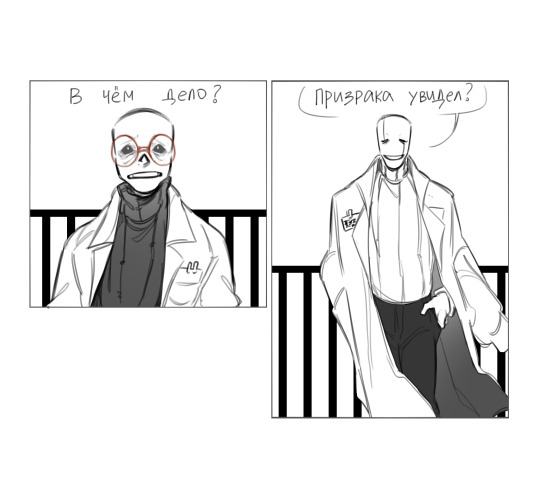
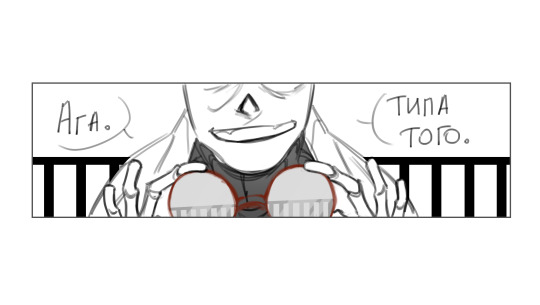
"What’s wrong? Saw a ghost?" "Yeah, something like that".
172 notes
·
View notes
Text

Belsky Lab
Another Severance-inspired laboratory center for your secret science career sims!
Now for DOWNLOAD!
SFS | OneDrive
Notes: the lot is zoned as residential on the largest (50 x 60? 60 x 50?) lot size, because I feel that this lot is perhaps best not open to the public.
Cleaninstaller is recommended when installing the lot, although the lot has been cleaned and packaged without unnecessary mods.
I have also included a document with a list of CC used in this lot and those used in Belsky Work (check out Part I here).
Previews and layout below the cut:






#ts2#the sims 2#thesims2#project: belsky work#ts2 download#ts2 lot#my lot#severance#lot: science lab#500 followers gift
23 notes
·
View notes